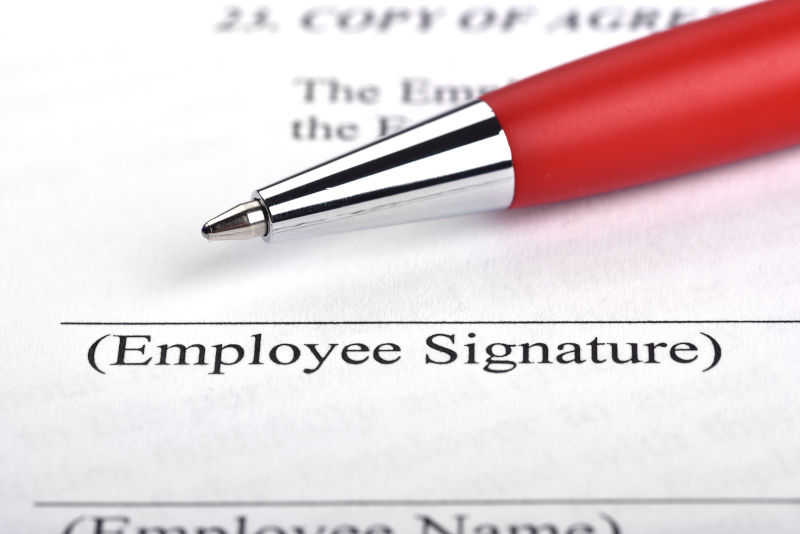Finding out that your company no longer wants you to work for them can be demoralising and being sacked can lead you feeling an array of emotions. You may feel like you have been unfairly dismissed. Unfair dismissal is a statutory right available to employees who feel this has occurred. An employer is legally required to have a good reason (as set out in legislation) for dismissing you and must follow a fair procedure.
By exercising your statutory right and making an unfair dismissal claim you could receive compensation for the loss of your job. From April 2019 to March 2020 the average Tribunal claim award for such claims was £10,812. Making such a claim can help you financially in a period of uncertainty and it can help you achieve some justice. A successful unfair dismissal claim confirms that your employer’s actions have been unjust.
Are you eligible to make an unfair dismissal claim?
Before exploring whether you may have been unfairly dismissed you must ensure that you are eligible to make such a claim. There are four key things that you need to check:
- Your employment status because your rights depend on whether you are an employee. Read our blog if you would like more information on this topic.
- That you have actually been dismissed.
- The duration of your continuous employment.
- The time limit. Usually, all dismissal claims must be brought within 3 months, less one day from the date of termination plus any extension of time as a result of ACAS Early Conciliation (See “ACAS Early Conciliation”). ACAS EC must be started within this 3-month period. For example, if you were dismissed on the 10th of April, you would have until the 9th of July to start ACAS EC. You then must ensure that your claim is submitted in time. An extension of time can be granted in certain circumstances but this is very rare.
That you have actually been dismissed
It may seem obvious that if you are sacked by your employer you would be considered to have been dismissed. However, the word ‘dismissed’ covers a much broader scope than you may think. There are three categories of dismissal:
- Termination by the Employer.
- Expiry of a limited-term contract. This includes fixed-term contracts and other contracts that expire on the completion of a specific task. The failure to renew such contracts on the same terms as before will count as a dismissal.
- Constructive dismissal – this is where you resign in response to a fundamental breach of your contract by your employer for example if they have unilaterally and significantly changed your job role, duties and responsibilities without any prior consultation or have not paid you. See “Constructive Dismissal Claims”.
In a constructive dismissal situation, does it matter if I do not resign immediately after the breach of my contract?
A Tribunal will look at whether you have unreasonably delayed your resignation and can infer a delay to mean that you have treated the contract as continuing, therefore losing your right to claim a constructive dismissal. So, you should act quickly.
We understand that it may be difficult to a) understand whether your employer has fundamentally breached your contract, and b) make the decision to resign because of this. Therefore, if you would like any specialist advice on your situation, Truth Legal is here to help you. Please do not hesitate to contact us for advice about your own unique circumstances.
Duration of Continuous Employment
Generally speaking a dismissal can only be challenged if you have worked for your employer for 2 or more years. This is known as the ‘qualifying period’. There are circumstances in which the qualifying period is not necessary (this will be explored later in this article). In most cases, calculating the continuity of employment will be simple as it starts on the first day of employment and ends with the effective date of termination. Some interruptions in your employment can lead to you not satisfying the qualifying period.
What is the effective date of termination?
When notice is given, the effective date of termination is the date on which the notice expires. If no notice is given, the effective date of termination is your last day of service.
I was furloughed for a number of months due to Covid-19; do I still satisfy the qualifying period?
Yes, this period is counted towards your years of service as you retained your employment status during the furlough period. For example, if you worked for 20 months and then were furloughed for 6 months before being dismissed, you will satisfy the 2 year qualifying period.
Was I dismissed fairly?
A good starting point is to understand whether you have been fairly dismissed. The law says that a dismissal will be deemed to be fair if:
- Your employer shows that they have dismissed you for one of the following five reasons:
a) Misconduct.
b) Lack of capability (which covers health issues and general ability to carry out the role).
c) Redundancy.
d) Illegality.
e) Some Other Substantial Reason
- Your employer:
a) Followed a fair procedure; and
b) acted reasonably in treating the reason as a sufficient reason for dismissal.
Therefore, understanding your employer’s reasoning for your dismissal is paramount. You can request a written statement from your employer (if you do not already have one). Your employer will have 14 days to provide this. Not only will this document help you understand your employer’s reasoning but this document may also be used in evidence in any subsequent Tribunal proceedings.
If your employer unreasonably fails to give a written statement, then you will be able to bring an Employment Tribunal claim for this failure. A successful claim will result in the Tribunal making a declaration as to what the reasons for dismissal were and will award you two weeks’ pay (subject to the current limit which is £544 per week). If your employer has provided multiple reasons, they must outline the principal reason for your dismissal.
I do not believe the reason provided in the written statement to be the true reason for why I was dismissed, I believe they had an ulterior motive.
Understandably, your relationship with your employer may have broken down and therefore it can be normal to question the reason provided. You can be assured by the fact that in Tribunal proceedings it is your employer’s duty to prove that the potentially fair reason given is the real reason for your dismissal.
Misconduct
This could either be a single act of serious misconduct (usually termed gross misconduct) or a series of acts that are less serious such as repeated poor attendance. From a legal standpoint, the main difference between ‘ordinary’ misconduct and gross misconduct is that with the former your employer is expected to have given you previous warnings and have a final written warning on your file. Whereas with gross misconduct, your employer is entitled to dismiss you without notice or payment in lieu, and without having given you any previous warnings. Therefore, it is useful to differentiate between the two.
Examples of gross misconduct are usually outlined in your employer’s disciplinary procedure or staff handbook. You should know that the label which your employer attaches to the type of conduct is not decisive as Tribunals will consider both the character of the conduct and whether the employer was reasonable in regarding that particular conduct to be considered as gross misconduct. As previously mentioned, it is your employer’s duty to show the reason for dismissal, and therefore they must demonstrate that they believed you to be guilty of the misconduct.
Can I be fairly dismissed for conduct outside of my workplace? Does this extend to my social media?
To put simply, yes. However, this does vary from case to case. The key factors to look at are a) whether your conduct affects your ability to do your work, and b) whether the conduct can damage your employer’s reputation. A lot of people use Twitter, Instagram and LinkedIn to share their thoughts with their friends and connections. It is a great mechanism to freely express your opinions, but you must be mindful of making any comments or liking/sharing posts that can be viewed as offensive or abusive, amount to bullying, and so on. A calculated approach should be taken when it comes to social media as your activity could potentially be viewed by a large audience.
Lack of capability (or qualifications) to do the job
When it comes to capability, your employer will look at your skill, aptitude, health or any physical or mental capability to do your job. When it comes to dismissals relating to your capability a lot of factors are usually considered including whether:
- You knew what was required to do the job.
- You had a proper appraisal, and any problem was identified.
- Your employer provided training, supervision, and encouragement.
- Your employer warned you of the consequences of failing to improve.
The most common example of incapability to do a job is poor performance. When it comes to poor performance, it is very unlikely that a single act will warrant a fair dismissal. However, there are roles e.g., a train driver, where a single mistake could be so grave and lead to major consequences and therefore may warrant dismissal.
Redundancy
Your employer will have usually acted fair if they:
- Warned and consulted you along with any other affected employees.
- Adopted a fair process when deciding on the selection pool.
- Took steps as may be reasonable to avoid or minimise redundancy by offering potentially redundant employees an alternative job within its own organisation.
If you have been made redundant and want further information, read our Blog: Am I Redundant & What Are My Rights?
Illegality
Your employer can fairly dismiss you if it is no longer lawful to employ you due to a statutory restriction for example if you were a driver and you lost your driving licence.
Some Other Substantial Reason
The final fair reason is that the dismissal is for ‘some other substantial reason of a kind such as to justify the dismissal of an employee holding the position which the employee held’. In other words, this is a ‘catch-all’ category that is designed for employers to rely upon if none of the other potentially fair reasons apply. Business restructures that do not meet the definition of redundancy fall into this categorically, as could a breakdown in the employment relationship.
Even if your employer dismisses you for one of the reasons above, the dismissal may nevertheless be deemed unfair.
Fairness and reasonableness
Generally speaking there is a requirement that, in order for an employer to act reasonably, they must show that they have followed a fair procedure. With conduct and performance dismissals, employers should follow the ACAS code. A failure by the employer to follow the ACAS code can affect the amount of compensation you receive as Tribunals have the power to increase your award up by to 25%.
Moving on to the procedure itself, your employer should:
- Investigate the issue.
- Inform you of the issues in writing which usually includes the alleged misconduct or performance issue, any evidence from their investigation, any other information they plan to talk about and the possible outcomes.
- Conduct a disciplinary hearing or meeting with you. You have the right to be accompanied by either a work colleague, or a trade union representative/official.
- Inform you of the decision in writing and include a right of appeal.
Should I appeal the decision if I don’t think my employer will change their mind? If so, why should I as I will be making an unfair dismissal claim.
If you consider your employer’s decision to be wrong and unjust then you should exercise your right to appeal, as failure to do so may lead to the Tribunal reducing the amount of compensation you are awarded (if you are successful in your claim). It may also suggest that you accept the findings.
In addition to a Tribunal looking at whether a fair procedure was followed, the Tribunal will consider whether your employer’s reason for dismissal was reasonable or unreasonable by taking into account all of the circumstances of the case. They will consider things such as whether:
- The decision to dismiss fell within the range of reasonable responses that a reasonable employer would have adopted in those specific circumstances. For example, even if the employer does have grounds for dismissal, would an informal discussion with you, or a written warning have been more appropriate in the circumstances?
- Your employer’s policy has been applied consistently and fairly. A history of how similar misconduct was dealt with in the past can be relevant.
- The employer set clear standards of conduct and performance. If such standards are outlined in the staff handbook, then it may be difficult to argue otherwise.
What happens if I do not have 2 years’ continuous service?
You will not be able to make an ordinary unfair dismissal claim. However, you may be able to make a claim for an automatically unfair dismissal in certain circumstances. Further, if you have been discriminated against, you do not need to satisfy the qualifying period to make a claim. This article will mainly focus on the former.
If you have been dismissed for a reason that is automatically unfair (see below), there is no need to show that your employer acted unreasonably or failed to follow a fair procedure. However, the burden will shift from your employer (needing to show that they dismissed you for one of the ‘fair reasons’) to you having to prove this. You will need to point to facts or matters from which a Tribunal can draw an inference that the dismissal was due to an inadmissible reason i.e. an automatically unfair reason. Below we will explore some of the most common automatically unfair reasons for dismissal:
- Dismissal for asserting a statutory right.
- Health and Safety.
- Trade Union membership or activities.
- Whistleblowing
- Pregnancy and childbirth.
Dismissal for asserting a statutory right
Statutory employment rights are provided by Acts of Parliament. Asking for what you are entitled to by law is called asserting a statutory right. Examples of such rights include asking for the following:
- Written statement of your terms of employment.
- To be paid at least the national minimum wage.
- To take paid holiday.
- To request to work part-time or flexibly.
Health and Safety
You will be considered to have been automatically unfairly dismissed if you were dismissed because you raised health and safety concerns. Also, you have the right not to be subjected to a detriment if you leave your workplace (or refuse to return to your workplace) because you reasonably believe that you are in serious or imminent danger.
Given the pandemic, the number of cases being brought forward to the Tribunals under this category may significantly increase in the coming months. Recently a case came to the Tribunal whereby the Judge accepted in principle that conditions pertaining to Covid-19 could potentially amount to circumstances of serious imminent and danger, provided this belief is reasonably held. However, it must be noted that the Claimant in this case was unsuccessful. Therefore, the circumstances of each case will be individually assessed and factors such as what relevant Covid-19 measures your employer has taken will be considered. We are sure this is an area of law which many employment solicitors will keep an eye out for future developments.
Trade Union membership or activities
Employers are protected from detriment or dismissal for:
- Being members of a trade union.
- Taking part, or having taken part, in trade union activities.
- Having used or proposed to use trade union services.
It is important to note that trade union activities or services must take place or be used at an appropriate time, this usually means outside of your working hours or during an agreed time within working hours.
Such protection is only applicable where there is a clear link between the activities that cause the dismissal and the trade union.
Whistleblowing
There is a protection in place for workers who report malpractices by their employers or third parties against being subjected to a detriment, dismissal and victimisation. Therefore, the dismissal of an employee will be automatically unfair if the reason, or principal reason, for their dismissal is that they have made a protected disclosure.
For further information on Whistleblowing, please see our Whistleblowing Claims page.
Pregnancy and birth
If you can show that the reason for your dismissal was connected to your pregnancy or childbirth, then this will be deemed as an automatic unfair dismissal. Additionally, such a dismissal can also be considered discrimination, and therefore you could make a separate discrimination claim in conjunction with your unfair dismissal claim. You should also know that your employer is not allowed to select you for redundancy for reasons relating to your pregnancy or maternity.
This can be a complex area of law, but further key rights are as follows:
- You are entitled to take maternity leave.
- If you are returning before the end of the first 26 weeks of maternity leave, you are entitled to return to the same job as before.
- If more than 26 weeks maternity leave is taken you usually have the right to return to the same job or if that is not reasonably practical you have the right to return to a job of a similar nature (e.g., terms and conditions, pay, hours) and a job that is not less favourable than your previous job.
- During your maternity leave if you are made redundant, you are entitled to be offered any suitable vacancy in priority over any other ‘at risk’ employees.
If your employer fails to follow the above, you could have been automatically unfairly dismissed.
Contact Truth Legal
This area of law can be complicated, but this should not worry you, if you have any questions about your circumstances feel free to get in touch. Truth Legal’s specialist employment law solicitors have extensive experience of securing compensation for employees who have been unfairly dismissed. We pride ourselves on providing an ethical, honest service to all of our clients.
Further Reading
From one of the UK’s most read legal blogs.










